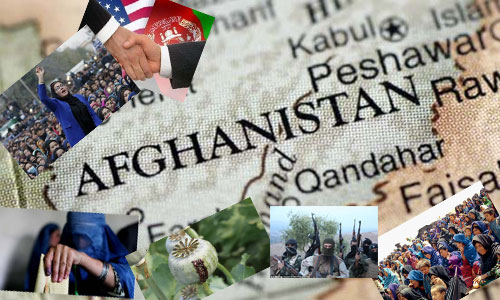Any assessment of where Afghanistan stands today needs to be put into its historical context. In doing so, it should be recalled that even before the advent of the present conflict, Afghanistan had been one of the least developed countries in the world. The country’s development was hindered by competing Russian and British empires for more than two centuries.
The imperial tensions and rivalry effectively reduced Afghanistan to one of the most isolated buffer states in the world. But before the colonial era, Afghanistan had been the roundabout of the ancient Silk Road, indeed, its gateway to the north, south, east, and west for commercial and civilizational interactions.
To fast forward, despite Afghanistan’s imposed isolation under colonial influence, much of what the country had managed to achieve in state-building and sustainable development was destroyed in the 1980s and 1990s. Hence, Afghans’ hard-earned gains of the past 17 years in the areas of security, governance and democracy, and development remain a work in progress.
This means that international aid efforts will have to continue in Afghanistan, until Afghans firmly stand on their own. The transformation of Afghanistan — from statelessness and anarchy under the Taliban to where the country stands today — has helped maintain regional stability and global peace. And this has had direct and indirect dividends for the homeland security of Afghanistan’s allies and partners in the region and beyond.
In taking stock of Afghanistan’s challenges, increasing insecurity takes center stage. However, in recent years, the Afghan army and police forces have bravely continued to fight against terrorism and organized crime but it was lots of ups downs. Hundreds of civilians including children and women have killed which were unprecedented since 2001.
what became clearer for people that it is not a civil war among Afghans but a war over Afghanistan where more than a dozen regional and transnational terrorist groups have converged to undo the country’s gains of the past 17 years, to weaken and topple the Afghan state, and to exploit the Afghan soil for launching attacks against targets in the region and beyond.
The Taliban, which operate from certain safe sanctuaries and enjoy institutional support from regional and international intelligence network, provide an enabling operational environment for all other terrorist groups in Afghanistan.
Without this overarching umbrella and operational platform, foreign militants could have hardly gained a foothold to destabilize Afghanistan, the region, and the world at large. These intertwined networks of terror, violence, and death — maintained by state-sponsorship of terrorism — drive drug production in Afghanistan.
The Taliban alone make some $200 million off the illicit drug business. This sum finances their terrorist activities across Afghanistan. A deepening symbiotic relationship between terrorism and drug production is responsible for about 87 percent increase in opium production in Afghanistan. It also accounts thousands of civilian and non-civilian causalities all across the country.
Moreover, terrorists targeting places of worship, religious leaders, and worshipers.
As Afghan forces battle these intertwined regional and transnational security and criminal threats, the message of the Afghan government to all armed groups, including the Taliban, is clear: They will not win in the battlefield so long as they continue fighting.
But they can choose to accept Afghan government’s offer to negotiate a political settlement for peace. Indeed, peace is not simply what the Afghan people desire but need to thrive toward a secure future in peaceful and prosperous co-existence with all their near and far neighbors.
Achieving a just peace in Afghanistan is impossible without institutionalization of good governance and rule of law, based on the country’s progressive constitution. At the heart of this endeavor — to secure the future of its youthful population with 70 percent under the age of 25 — is to fight and eliminate endemic corruption.
Corruption weakens Afghanistan’s nascent state and empowers its enemy. It is the mother of all threats to Afghanistan’s stabilization and sustainable development.
Sustainable development is intertwined with security and democratic governance. In the Afghan context, human security and protective security are mutually reinforcing one another. Investment in one delivers dividends for the rest and vice versa.
However, in parallel to these and other poverty reduction efforts, the Afghan government has continued to help develop the private sector to create sustainable jobs and drive growth. For example, president has Ghani identified the 11 top constraints facing the private sector in Afghanistan. So far, better business licensing has been advanced; punitive tax penalties abolished; and public-private partnerships legislation developed. And much more is being done to provide the right environment for attracting and retaining domestic and foreign investment in Afghanistan’s virgin markets.
The above summary of achievements and challenges sheds light on the way forward for the next years. The root cause of insecurity — which hampers Afghanistan’s state-building process and sustainable development — lies outside of the country and imposed on Afghan nation with the help of internal elements.
The immense potential of South Asia and Central Asia for economic growth has been taken hostage by a known regional state-actor and its proxies. The latter is exploited to destabilize Afghanistan and to enable in the country an operational environment for transnational terrorist networks.
Indeed, the success of the government for securing sustainable peace in Afghanistan would hinge on regional cooperation, broader international support and active diplomacy of the government. That is why international efforts in support of peace, stability and prosperity in Afghanistan must focus on helping Afghanistan-led mechanisms and initiatives for regional security and development cooperation deliver tangible results.
Home » Opinion » Afghanistan: Achievements and Challenges 2018
Afghanistan: Achievements and Challenges 2018
| Mohammad Zahir Akbari

